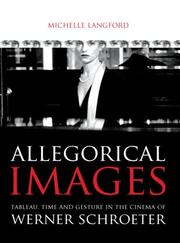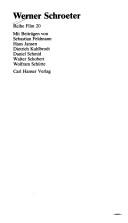| Listing 1 - 10 of 11 | << page >> |
Sort by
|
Article
Abstract | Keywords | Export | Availability | Bookmark
 Loading...
Loading...Choose an application
- Reference Manager
- EndNote
- RefWorks (Direct export to RefWorks)
Article
Abstract | Keywords | Export | Availability | Bookmark
 Loading...
Loading...Choose an application
- Reference Manager
- EndNote
- RefWorks (Direct export to RefWorks)
Article
Abstract | Keywords | Export | Availability | Bookmark
 Loading...
Loading...Choose an application
- Reference Manager
- EndNote
- RefWorks (Direct export to RefWorks)
Book
ISBN: 3596105439 Year: 1991 Publisher: Frankfurt am Main Fischer Taschenbuch Verlag
Abstract | Keywords | Export | Availability | Bookmark
 Loading...
Loading...Choose an application
- Reference Manager
- EndNote
- RefWorks (Direct export to RefWorks)
Article
Abstract | Keywords | Export | Availability | Bookmark
 Loading...
Loading...Choose an application
- Reference Manager
- EndNote
- RefWorks (Direct export to RefWorks)
Dombasle, Arielle --- Huppert, Isabelle --- Schroeter, Werner

ISBN: 1280709588 9786610709588 5551580342 1841509558 9781841509556 9781280709586 9785551580348 9781841501383 1841501387 6610709580 Year: 2006 Publisher: Bristol : Intellect,
Abstract | Keywords | Export | Availability | Bookmark
 Loading...
Loading...Choose an application
- Reference Manager
- EndNote
- RefWorks (Direct export to RefWorks)
Werner Schroeter is one of the most important and influential directors of the New German Cinema, yet discussion of his films within film theory has been intermittent and un-sustained. This book provides a long-overdue introduction to Schroeter's visually lavish, idiosyncratic and conceptually rich cinema, situating its emergence within the context of the West German television and film subsidy system during the 1970's, then moving on to engage with some of the most pertinent and important arguments in contemporary film theory.
Art and technology. --- Judaism and art. --- Schroeter, Werner. --- Music, Dance, Drama & Film --- Film --- Schroeter, Werner

ISBN: 3446128557 9783446128552 Year: 1980 Publisher: München Hanser
Abstract | Keywords | Export | Availability | Bookmark
 Loading...
Loading...Choose an application
- Reference Manager
- EndNote
- RefWorks (Direct export to RefWorks)
CDL --- 791.471 SCHROETER --- Schroeter, Werner, --- Schröter, Werner,
Book
ISBN: 9783901644740 3901644741 Year: 2018 Volume: 32 Publisher: Vienna : Osterreichisches Filmmuseum : SYNEMA - Gesellschaft fur Film und Medien,
Abstract | Keywords | Export | Availability | Bookmark
 Loading...
Loading...Choose an application
- Reference Manager
- EndNote
- RefWorks (Direct export to RefWorks)
In a four-decade-long career that generated more than forty films and numerous stage productions, Werner Schroeter became one of the most important directors in Germany and Europe since the late 1960s. After making a flurry of short films in a climate of feverish artistic experimentation and political upheaval, Schroeter soon gained recognition for Eika Katappa (1969) and The Death of Maria Malibran (1971), early mature works showcasing avant-garde performance as iconoclastic expression of rebellion and pathos. Following a decade of uncompromising experimental work, his deeply humanist features Il Regno di Napoli (1979) and Palermo or Wolfsburg (1980) brought him broader success. Yet Schroeter maintained his reputation as an enfant terrible of the German cultural scene with controversial stagings of operas and plays and with smartly observed documentaries on art, film, and politics. This volume traces Schroeter?s career as a filmmaker from early and rarely discussed works such as Salome (1971) and Willow Springs (1973) to his late 1970s breakout hits and later complex and mature art-house productions such as The Rose King (1986), Malina (1991), and Nuit de Chien (2008). The volume is supplemented by Schroeter?s own writings and conversations and includes an interview with his long-time collaborator Elfi Mikesch as well as an authoritative and completely updated filmography.
Schroeter, Werner, --- Motion picture producers and directors --- film --- filmgeschiedenis --- filmregisseurs --- Duitsland --- twintigste eeuw --- Schroeter Werner --- 791.471 SCHROETER --- Directors, Motion picture --- Film directors --- Film producers --- Filmmakers --- Motion picture directors --- Moviemakers --- Moving-picture producers and directors --- Producers, Motion picture --- Schröter, Werner, --- Criticism and interpretation --- Conferences - Meetings --- Persons --- Schroeter, Werner
Book
ISBN: 1685710573 1685710565 Year: 2022 Publisher: Brooklyn, NY punctum books
Abstract | Keywords | Export | Availability | Bookmark
 Loading...
Loading...Choose an application
- Reference Manager
- EndNote
- RefWorks (Direct export to RefWorks)
A Credible Utopia: Essays on Selected Films of Werner Schroeter offers unique and personal insights into Schroeter’s cinematic universe. Many of the films discussed in this book are those upon which Schroeter’s worldwide reputation rests: Der Bomberpilot, an absurdist comedy; The Death of Maria Malibran, a film about ecstatic redemption in death; Willow Springs, about the complex relationships between men and women; Day of the Idiots, a visually baroque, operatic and highly dramatic film about madness; The Kingdom of Naples, Schroeter’s visually stunning depiction of Italy in the post-war years; and Palermo or Wolfsburg, for which Schroeter won the Golden Bear, an epic film about love, violence, and cultural malaise. But Valente also addresses Schroeter's early experimental films that don't get as much attention, such as Aggression, Neurasia, and Argila, all of which are about the struggle between repression and desire, and Deux, a late work that Schroeter considered his masterpiece, a film about the double and the ways in which identity is formed by integrating the abject part of ourselves with the good. Valente concludes with an analysis of Nuit de Chien, Schroeter's final film, a powerful summation of a live devoted to art, music, literature, and film.When the Museum of Modern Art staged a retrospective of Schroeter's ouevre in 2012, there was hardly anything in English on his films and only one film available on DVD in the US, such that Schroeter's work as a director has remained largely invisible in the English-speaking world. A Credible Utopia repairs this lacuna in film history, and, in a detailed and intimate reading of Schroeter's queer ouevre, links all these films together through Schroeter's desire for a “credible utopia,” despite our shared awareness of disaster, torture, viciousness, and political corruption in the world.
Book
ISBN: 2851810723 9782851810724 Year: 1988 Publisher: Paris: L'arche,
Abstract | Keywords | Export | Availability | Bookmark
 Loading...
Loading...Choose an application
- Reference Manager
- EndNote
- RefWorks (Direct export to RefWorks)
Wim Wenders Texte français de Bernard Eisenschitz --- film --- Duitsland --- filmregisseurs --- filmtheorie --- filmkritiek --- Wenders Wim --- Verenigde Staten --- filmgeschiedenis --- Schroeter Werner --- Hitchcock Alfred --- 791.471 WENDERS --- Wim Wenders ; Texte français de Bernard Eisenschitz
| Listing 1 - 10 of 11 | << page >> |
Sort by
|

 Search
Search Feedback
Feedback About UniCat
About UniCat  Help
Help News
News